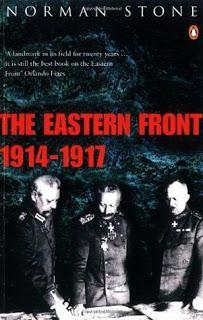 Stone, Norman. The Eastern Front, 1914-1917. eBook edition, London: Penguin, 2008. 427 pp. Originally published by London: Penguin, 1975.
Stone, Norman. The Eastern Front, 1914-1917. eBook edition, London: Penguin, 2008. 427 pp. Originally published by London: Penguin, 1975. For decades, comprehensive English-language studies of the Eastern Front of World War I were rare. Thanks to the Cold War, Western historians had little or no access to Soviet archives, relying on whatever sketchy material (memoirs, scattered papers, Western reports) made its way out of Russia before the Iron Curtain fell. Thus even so acclaimed a work as Norman Stone's The Eastern Front 1914-1917 suffers from significant deficiencies beyond the author's control.
In recent years, this topic has received more treatment: Alexander Watson and Geoffrey Wawro explore it mainly from the Central Powers perspective, while Dominic Levin's The End of Tsarist Russiaprobes the military and political context while skimming on the battles. Prit Buttar is currently working on a comprehensive four-volume military history, though I didn't have access to them. So I settled for Stone's account, which is probably better as an introduction than a definitive study.
Stone briefly sketches prewar Russia using the standard portraiture of an ossified empire perched on a precipice. After the disastrous Russo-Japanese War and abortive 1905 revolution, "even the most convinced conservatives [decided] that the system must be changed" (23). Along with ineffectual, half-hearted political reforms, Tsar Nicholas authorized the creation of a General Staff with mixed results. While Russia's armies in 1914 went to war with relatively modern material, they were straightjacketed by logistical hindrances and an officer corps who "had a way of falling into pure traditionalism" (30).
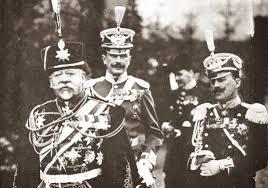
Sukhomlinov (left) with his staff
This latter point, Stone feels, accounts for Russia's military failures in the war. One culprit was Vladimir Sukhomlinov, a cavalry general who became Chief of the General Staff and Minister of War, responsible for running the Russian military. Unfortunately, Sukhomlinov spent much of his time purging the officer corps of administrative rivals, however able they were, and peopling it with toadies and reactionaries. When major appointments became available, the Marshall and his rivals (37)fought as to which of their nominees should be appointed; and, quite often, appointment of one side's nominee to one command would be cancelled out by the appointment of the other side's nominee to be his chief of staff, and then reinforced by appointment of the first side's man to the third most senior post, that of Quarter Master General. It was common for commanders not to talk either with their own chiefs of staff, or to a neighboring army commander, but to have excellent relations with their Quarter Master General.
Such one-upsmanship boded ill for a country whose alliance with France and protectorship of Serbia necessitated its going to war. Similar debates raged about the need for an offensive-minded army or fortifying Russia's western frontier, or the importance of cavalry in a modern war. While Sukhomlinov would be sacked in June 1915 on grounds of incompetence, the problems his tenure left their mark on the battlefields in Galicia and East Prussia.
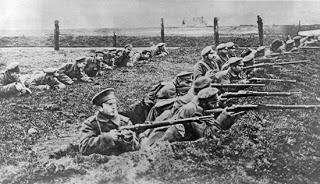
Russian troops at the frontline
The book comes alive detailing this administrative pettiness, along with the outrageous shortcomings of Russia's aristocratic officer corps. The Battle of Tannenberg, Germany's decisive defeat of Russia's invasion of East Prussia, hinged in large part in the rivalry between Alexander Samosonov and Paul von Rennenkampf, whose rivalry extended back to a public brawl during the Russo-Japanese War. Or General Danilov, who went to the front with an ornamented railcar containing his mistress. Or an aged cavalry officer whose hemorrhoids prevented him from mounting his horse, causing his capture by German troops.Stone fares best detailing the tactics of battles like Tannenberg. There, German Generals Paul von Hindenburg and Erich Ludendorff took advantage of poor coordination between invading Russian armies to envelop and destroy them piecemeal. Where other historians tout their achievement as a strategic masterpiece, Stone is more sanguine, emphasizing Russian blunders over German brilliance. Where Samsonov (who committed suicide after the battle) and von Rennenkampf overreached
The Germany VIII Army in East Prussia had won, at least partly because sense had been imposed on it. The army was small enough to be controlled. The invasion routes, the lines of retreat, and the possible areas of riposte had been clearly marked out; there was a railway system that allowed transport at least of [General Hermann von] Francois's corps; and in any case there were seven other armies in the west to pick up the pieces if things went wrong.
Though Russia fared better against the hapless Austrians in Galicia and Poland, even there administrative concerns (overloaded railways, poor coordination) prevented a decisive victory. Mainly, the Russians benefitted from the fact that both Germany and Austria considered the Eastern Front secondary; Germany sought its ultimate victory in France and Belgium, while Austria considered Italy a greater threat.
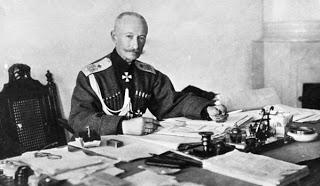
General Brusilov
After many such defeats, the Russian high command turned to a new general, Aleksei Brusilov, who learned from experience and disaster. The Brusilov Offensive, in spring 1916, was the high-point of Russia's war effort, a multifaceted offensive that Stone deems "the most brilliant victory of the war" (288). Using tactics which prefigured the Blitzkrieg of a later generation, Brusilov targeted his opponents with targeted artillery bombardments and surprise attacks on specific locations. Between June and September the Russians racked up an impressive success, driving 250 miles into Austrian territory and coming within a hair's breadth of total victory.Unfortunately, this success proved ephemeral. Tactical caution from the Russian command prevented a decisive breakthrough, while German reinforcements stiffened the wavering Austrians. Stone treats Romania's belated, opportunistic entry into the war, attacking Austria as Brusilov's offensive ebbed, as another decisive factor. For the only time in the war, all four Central Powers (Germany, Austria, Bulgaria and Turkey) concentrated on the same front, smashing Romania's pathetic army and forcing Brusilov to divert troops to cover his flank. This destroyed Brusilov's momentum and brought the Russian army to a standstill, setting the stage for the tumultuous events of 1917.
In describing these campaigns and the handicaps facing Russian commanders, Stone excels. He shows how, unlike the more famous battles in the West, the Eastern Front remained a highly mobile war which spurred shockingly high casualties. He emphasizes Russia's shortcomings in infrastructure and industry, but also points out that the "shell shortage" of 1915, which contributed in part to disasters at Warsaw and Lvov, wasn't any more severe in Russia than what occurred in Britain and France, nominally more advanced countries.
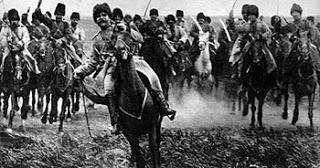 But Stone's book falls short in numerous other areas. The most glaring is his near-complete elision of on-the-ground experiences of soldiers, remaining in the lofty world of armies maneuvering on maps. His political analyses are often facile, especially when exploring the Russian Revolution. Though he correctly points out that reserve troops, rather than frontline infantry, turned against the regime, he's dismissive if not condescending towards the peasant contribution to the war effort, blaming their fickleness in part for the government's collapse. He concludes, not inaccurately but simplistically, that "the First World War provoked a crisis of economic modernization, and Bolshevik revolution was the outcome" (336).
But Stone's book falls short in numerous other areas. The most glaring is his near-complete elision of on-the-ground experiences of soldiers, remaining in the lofty world of armies maneuvering on maps. His political analyses are often facile, especially when exploring the Russian Revolution. Though he correctly points out that reserve troops, rather than frontline infantry, turned against the regime, he's dismissive if not condescending towards the peasant contribution to the war effort, blaming their fickleness in part for the government's collapse. He concludes, not inaccurately but simplistically, that "the First World War provoked a crisis of economic modernization, and Bolshevik revolution was the outcome" (336).Even were it more comprehensive, I'd probably recommend Stone's book to hardcore military buffs before casual readers. A little tactical discussion goes a long way, especially unleavened by more relatable descriptions of troop experiences. Hopefully, I'll get a chance to check out the more recent volumes soon.
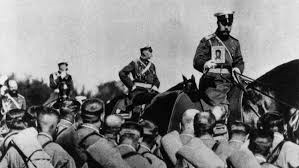 More history book reviews:
More history book reviews:- From the Jaws of Victory (1970, Charles Fair)
- The Guns of August (1962, Barbara W. Tuchman)
- The Proud Tower (1966, Barbara W. Tuchman)
- The Reason Why (1953, Cecil Woodham-Smith)
- Ring of Steel: Germany and Austria-Hungary in World War I (2014, Alexander Watson)
- The Siege (1970, Russell Braddon)
- The Sad, Sorry World of Watergate Memoirs

